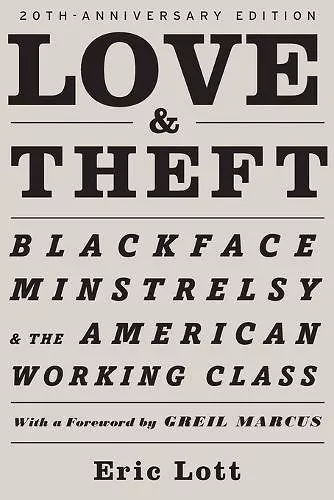Love & Theft
Blackface Minstrelsy and the American Working Class
Eric Lott author Greil Marcus author
Format:Paperback
Publisher:Oxford University Press Inc
Published:12th Sep '13
Currently unavailable, and unfortunately no date known when it will be back

For over two centuries, America has celebrated the very black culture it attempts to control and repress, and nowhere is this phenomenon more apparent than in the strange practice of blackface performance. Born of extreme racial and class conflicts, the blackface minstrel show sometimes usefully intensified them. Based on the appropriation of black dialect, music, and dance, minstrelsy at once applauded and lampooned black culture, ironically contributing to a "blackening of America." Drawing on recent research in cultural studies and social history, Eric Lott examines the role of the blackface minstrel show in the political struggles of the years leading up to the Civil War. Reading minstrel music, lyrics, jokes, burlesque skits, and illustrations in tandem with working-class racial ideologies and the sex/gender system, Love and Theft argues that blackface minstrelsy both embodied and disrupted the racial tendencies of its largely white, male, working-class audiences. Underwritten by envy as well as repulsion, sympathetic identification as well as fear--a dialectic of "love and theft"--the minstrel show continually transgressed the color line even as it enabled the formation of a self-consciously white working class. Lott exposes minstrelsy as a signifier for multiple breaches: the rift between high and low cultures, the commodification of the dispossessed by the empowered, the attraction mixed with guilt of whites caught in the act of cultural thievery.
"[Lott] takes advantage of the space opened by the times from which it emerged, while also sustaining a critical perspective." --David Roediger, Project Muse Reviews of the previous edition: "Terrifically smart and unexpectedly timely."--New York Times "One of the most stimulating and nuanced accounts of 19th-century blackface minstrelsy."--Boston Phoenix "Original and erudite....A clever, disciplined, and resourceful reading of the commonplace: a pioneering study."--Kirkus Reviews "Love and Theft is an original and absolutely brilliant contribution to understanding the politics of cultural production. Lott makes an incisive, provocative, and stunning analysis of the complex and contradictory ways in which minstrelsy embodied and acted out the class, racial, and sexual politics of its historical moment. As readers we come to understand for the first time how blackface performance imagined and addressed a national community and we realize the extent to which we still live with this legacy. An enthralling and important book."--Hazel Carby, Yale University "The author adroitly leads us through minstrelsy's maze of complex relationships....Ground-breaking work."--Theatre Survey "This spectacular book, a history of blackface from the bottom up, offers a gripping, original interpretation of the first and most popular form of nineteenth-century entertainment. Placing minstrelsy at the center of class, race, and political relations, and seeing blackface as a contaminated form of interracial desire, Love and Theft will stimulate vigorous debate. To dissent from portions of the argument in no way diminishes the subtlety and importance of Eric Lott's achievement."--Michael Rogin, University of California, Berkeley "[Lott] offers a stunning, provocative interpretation of the minstrel tradition....I found his insights into white male desire to appropriate or step into black bodies utterly fascinating and pretty funny."--Robin D.G. Kelly, The Nation "Lott's commitment to connecting the cultural to the political, and to exploring rather than castigating the structure of feeling behind blackface, make Love and Theft a model for how to study popular culture."--Alice Echols, The Village Voice "Love and Theft is relentlessly suggestive, thorough, learned, and smart: and most impressive of all, its reach doesn't exceed its grasp."--Michael Bérubé, American Literature "The analysis is smart in the sense that it is stylish, adroit, and contrived."--Quarterly Magazine of the Missouri Historical Society "Cultural history has entered a boom phase of late. Spurred by poststructuralist literary criticism, cultural historians have produced entirely new conceptual frameworks, not to mention innumerable specific insights, for interpreting the past. Eric Lott's study of minstrelsy and the American working class is a premier- indeed, prize-winning- example of the stunning results of this approach."--The Historian "This book is essential reading for anyone who wants to understand the minstrel show, and understanding the minstrel show is essential to understanding nineteenth-century American culture."--American Music "Eric Lott's recent contribution represents a major innovation in the study of this subject. Aside from a few scattered journal articles here and there, no critic has approached minstrelsy with anything like the theoretical sophistication that Lott brings to it....Some good work precedes Lott, but none comes close to having the interpretive acuity or critical audacity which characterizes Love and Theft....Love and Theft is a demanding book, it is also a tremendously rewarding one....Lott has come up with a fantastic book on blackface, but has provided an excellent example of how American Studies might be reinvigorated in the coming days."--South Carolina Review "This is an important book, and will likely be a model for historians who seek to blend cultural and labor history."--Journal of Social History "A brilliant and challenging exposition of a very ambiguous historical and social phenomenon."--Dan O'Bryan, Sierra Nevada College "Lott's project is ambitious, complex, and masterfully accomplished....the importance of his overall contribution is unassailable, and it offers an inspiring model for those seeking to bring an interdisciplinary perspective to the study of American history."--The Journal of American History "Wonderfully intelligent analysis of culture, history, American social expression, and how these all come together in popular culture and race....his analysis nicely prepares students to read African American literature in historical context."--Ray Waller, Florida International University "Interesting and useful."--Journal of American Culture
- Winner of Winner of the Avery O. Craven Award from the OAH Winner of the first annual MLA Prize for a First Book.
ISBN: 9780195320558
Dimensions: 245mm x 145mm x 16mm
Weight: 494g
352 pages